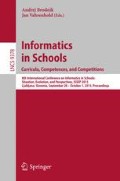Abstract
Young people are deterred from studying science, technology, engineering and mathematics (STEM) by the perception that such studies are boring and by a lack of self-efficacy. One approach towards increasing engagement with STEM is through the use of robotics in education, both in formal instruction and through informal activities such as competitions. There is a consensus that such activities are “fun” but there is almost no research on whether there is any educational advantage to robotics activities. We are investigating the extent to which participation in robotics education activities influence the attitudes of students towards STEM and their intentions concerning STEM studies in the future. The research framework and methodology is the theory of planned behavior (TPB), which claims that attitudes engender intentions, which in turn cause behavior. TPB is based upon questionnaires that are constructed based upon observations and interviews. The analysis of the answers from 106 questionnaires showed that the attitudes and the subjective norms were not as high as we expected, but the results for the subjective norms are of particular importance, because they show that students can be motivated by the respect and support they receive from their teachers and parents. The scores for the intentions predictor were very high, which implies that the students are like to choose to study STEM in the future.
Access this chapter
Tax calculation will be finalised at checkout
Purchases are for personal use only
Preview
Unable to display preview. Download preview PDF.
References
ACM: Journal of Educational Resources in Computing 3(4) (2003)
ACM: Journal of Educational Resources in Computing 4(3) (2004)
Adams, J.C.: Alice, middle schoolers & the imaginary worlds camps. SIGCSE Bulletin 39(1), 307–311 (2007)
Ajzen, I., Madden, T.: Prediction of goal-directed behavior: Attitudes, intentions, and perceived behavioral control. Journal of Experimental Social Psychology 22, 453–474 (1986)
Ajzen, I.: Perceived behavioral control, self-efficacy, locus of control, and the theory of planned behavior. Journal of Applied Social Psychology 32(4), 665–683 (2002)
Anderson, M., McKenzie, A., Wellman, B., Brown, M., Vrbsky, S.: Affecting attitudes in first-year computer science using syntax free robotics programming. ACM Inroads 2(3), 51–57 (2006)
Apiola, M., Lattu, M., Pasanen, T.: Creativity and intrinsic motivation in computer science education: experimenting with robots. In: 15th Annual Conference on Innovation and Technology in Computer Science Education (ITiCSE 2010), pp. 199–203 (2010)
Armoni, M., Meerbaum-Salant, O., Ben-Ari, M.: From Scratch to “real” programming. ACM Transactions on Computing Education 14(4), article 25 (2015)
Aspray, W., Mayadas, F., Vardi, M.Y. (eds.): Globalization and Offshoring of Software: A Report of the ACM Job Migration Task Force. ACM (2006), http://www.acm.org/globalizationreport/ (last accessed on March 10, 2015)
Ben-Bassat, L.R., Ben-Ari, M.: Adapting and merging methodologies in doctoral research. Computer Science Education 19(2), 51–67 (2009)
Carter, L.: Why students with an apparent aptitude for computer science don’t choose to major in computer science. SIGCSE Bulletin 38(1), 27–31 (2006)
Druin, A., Hendler, J. (eds.): Robots for Kids: Exploring New Technologies for Learning. Morgan Kaufmann (2000)
Gibbons, S.J., Hirsh, L.S., Kimmel, H., Rockland, R., Bloom, J.: Middle school students attitudes to knowledge about engineering. In: International Conference on Engineering Education, pp. 1–6 (2004)
Kelleher, C.: Motivating Programming: Using Storytelling to Make Computer Programming Attractive to More Middle School Girls. Ph.D. dissertation, Carnegie Mellon University (2006), http://www.cs.cmu.edu/~caitlin/kelleherThesis_CSD.pdf (last accessed on March 10, 2015)
Kelleher, C., Pausch, R.: Lowering the barriers to programming: A taxonomy of programming environments and languages for novice programmers. ACM Computing Surveys 37(2), 83–137 (2005)
Kumar, D.: Learning Computing with Robotics (2011), http://cs.brynmawr.edu/~dkumar/Myro/Text/Fall2011PS2/PDF/LCR2011.pdf (last accessed on March 10, 2015)
Margolis, J., Fisher, A.: Unlocking the Clubhouse: Women in Computing. MIT Press (2003)
Markham, S., King, K.: Experiences, outcomes, and attitudinal influences. In: 15th Annual Conference on Innovation and Technology in Computer Science Education (ITiCSE 2010), pp. 204–208 (2010)
McGill, M.: Learning to program with personal robots: Influences on student motivation. ACM Transactions on Computing Education 12(1), article 4 (2012)
Meerbaum-Salant, O., Armoni, M., Ben-Ari, M.: Learning computer science concepts with Scratch. Computer Science Education 23(3), 239–264 (2013)
Taub, R., Ben-Ari, M., Armoni, M.: The effect of CS Unplugged on middle-school students views of CS. In: 14th Annual ACM SIGCSE Conference on Innovation and Technology in Computer Science Education (ITiCSE 2009), pp. 99–103 (2009)
Verner, I., Ahlgren, D.: Robot contest as a laboratory for experiential engineering education. ACM Journal on Educational Resources in Computing 4(2), 2–28 (2004)
Zur Barguri, I.: A new curriculum for junior-high in computer science. In: 17th Annual Conference on Innovation and Technology in Computer Science Education (ITiCSE 2012), pp. 204–208 (2012)
Author information
Authors and Affiliations
Corresponding author
Editor information
Editors and Affiliations
Rights and permissions
Copyright information
© 2015 Springer International Publishing Switzerland
About this paper
Cite this paper
Levy, R.BB., Ben-Ari, M.(. (2015). Robotics Activities–Is the Investment Worthwhile?. In: Brodnik, A., Vahrenhold, J. (eds) Informatics in Schools. Curricula, Competences, and Competitions. ISSEP 2015. Lecture Notes in Computer Science(), vol 9378. Springer, Cham. https://doi.org/10.1007/978-3-319-25396-1_3
Download citation
DOI: https://doi.org/10.1007/978-3-319-25396-1_3
Published:
Publisher Name: Springer, Cham
Print ISBN: 978-3-319-25395-4
Online ISBN: 978-3-319-25396-1
eBook Packages: Computer ScienceComputer Science (R0)

